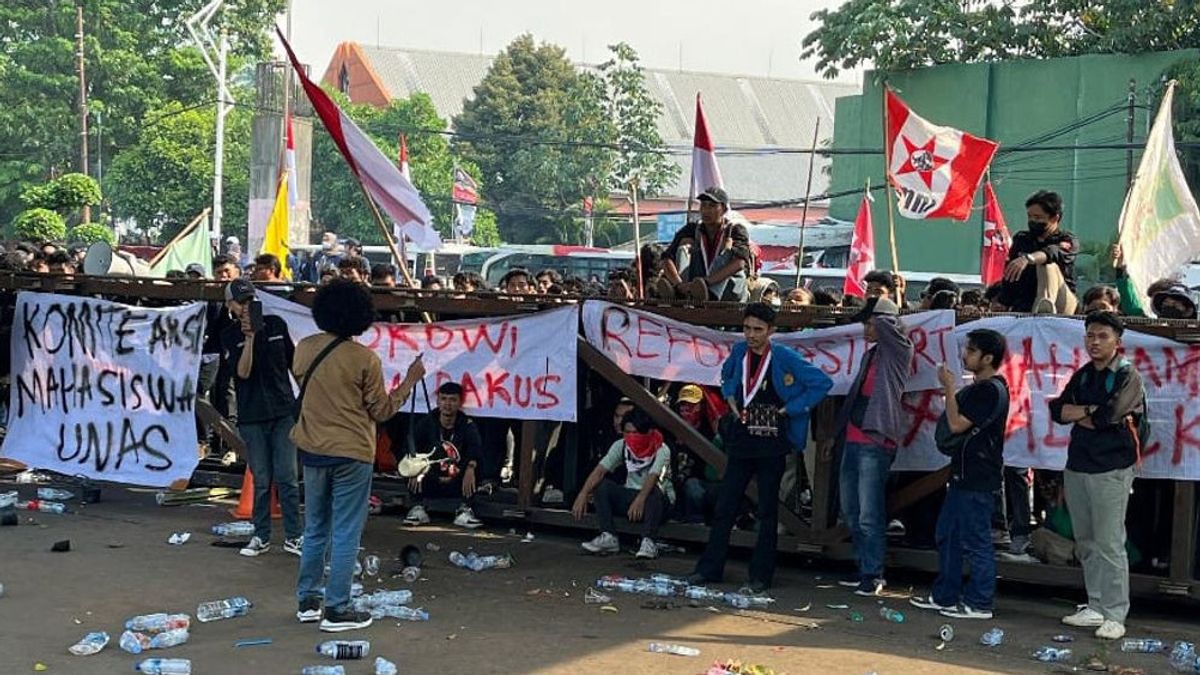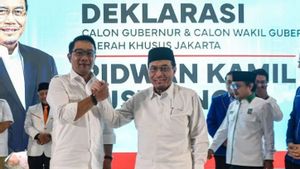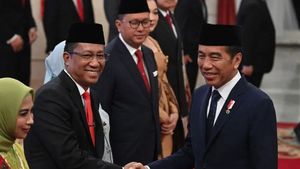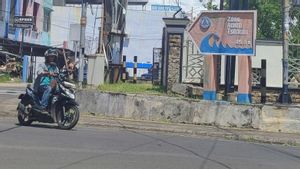JAKARTA The DPR finally canceled the plan to ratify the revision of the Pilkada Bill following a wave of protests in various regions. That way, during the 2024 Simultaneous Pilkada, they continued to follow the decision of the Constitious Court (MK).
In a press conference held Thursday (22/8/2024) evening, Deputy Speaker of the House of Representatives Sufmi Dasco Ahmad confirmed that during the registration of regional head candidates for regional elections on August 27, 2024, the Constitutional Court decided.
"Because we obey and obey the applicable rules, that at the time of registration, because the Pilkada Bill has not been passed into law, what applies is the result of the decision of the Constitutional Court for judicial review submitted by the Labor Party and the Gelora Party," explained Dasco.
Previously, on Thursday morning the DPR held a plenary meeting to ratify the Pilkada Bill. However, the meeting did not comply with the quorum or the minimum number of members who had to attend the meeting. As stated by Dasco, the Pilkada Bill was canceled so that the Constitutional Court's decision applies to this year's regional elections.
Dasco's statement is like a breath of fresh air in the midst of political chaos now. Researcher from the Political Research Center of the National Research and Innovation Agency (BRIN) Mouliza Donna Sweinstani emphasized that the struggle that had been carried out in a way by all elements of society must continue until the elections were carried out.
"Dasco's statement at a glance is arguably a breath of fresh air. But we as a society must maintain this democratic process. We can't just be careless, but we have to guard until this revision really exists," he said, Thursday (22/8).
The DPR plenary meeting to ratify the Pilkada Bill in the middle of this week was accompanied by community demonstrations in various regions. In addition to students from various universities, comics and public figures such as directors Joko Anwar and Reza Rahardian also took to the streets to oppose the DPR's plan.
Why is the DPR's quick work this time actually being opposed by the public?
The political dynamics of Indonesia is heating up for the umpteenth time, after the Legislation Body (Baleg) of the DPR accelerated the revision of Law Number 10 of 2016 concerning Regional Head Elections. The fast work of this legislative body is suspected as an attempt to thwart or disobedience to the constitution, according to an election lecturer at the Faculty of Law, University of Indonesia, Titi Anggraini.
The statement came after the DPR Beleg discussed the Pilkada Bill, just a day after the Constitutional Court's decision changed the requirements for the election nomination through the decision number 60/PUU-XXII/2024 and number 70/PPU-XXII/2024.
There are two Constitutional Court decisions that are considered positive in the midst of the country's political frenzy.
First, the Constitutional Court changes the threshold of nomination by political parties in the Pilkada Law by 20 percent of DPRD seats or 25 percent of valid votes. In the Constitutional Court's decision, parties or political parties that are election participants can nominate candidates for regional heads even though they do not have DPRD seats.
Meanwhile, parties that do not get a DPRD seat can still carry a candidate pair as long as they meet the percentage requirements calculated from the number of permanent voters or DPT. The requirements for political parties and a combination of political parties can carry a candidate, namely obtaining valid votes from 6.5 percent to 10 percent, depending on the number of permanent voters in the province.
But the Constitutional Court's decision, which is tried to be multiplied by the Legislative Council, still maintains a 20 percent threshold for DPRD seats or 25 percent of valid votes for parties that have seats. The Constitutional Court's decision regarding this threshold only applies to political parties that do not have seats in the DPRD.
Second, related to the minimum age limit for regional head candidates who are also in the public spotlight. The Constitutional Court's decision number 70/PPU-XXII/2024 confirms that the minimum age limit for candidates for governors remains 30 years and candidates for mayors/regents remains 25 years, when determined by the KPU as candidate pairs, not when inaugurated.
However, the DPR Baleg's decision to state that the lowest age limit for a candidate for governor is 30 years and the age limit for a candidate for mayor/regent is 25 years when officially inaugurated. They instead referred to the Supreme Court's decision in drafting this regulation, not to follow the Constitutional Court.
When the DPR Baleg passed the Pilkada Bill this week, a wave of protests flowed rapidly from various elements of society. A constitutional law lecturer from Andabura University, Charles Simabura, considers that the DPR only chooses the Constitutional Court's decision to benefit certain groups. He said the DPR had a 'cherry picking'.
The DPR recognizes the Constitutional Court's decision if it benefits them, and at other points it does not recognize other Constitutional Court decisions that harm them.
The Constitutional Court's decision regarding the parliamentary threshold of the DPRD is based on efforts to form fair competition among political parties. Without a parliamentary threshold, there will be more competitive regional head elections. In addition, the regional elections also avoid competition against empty boxes or doll candidates.
The polemic of the requirements for registering candidates for regional heads has recently also been heavily linked to the Jakarta DK Pilkada, one of the constituencies that is quite hot and fierce.
Before the Constitutional Court's decision emerged, 12 parties had expressed their support for the Ridwan Kamil-Suswono pair to run in the election for the Governor and Deputy Governor of Jakarta.
They are the Gerindra Party, the Golkar Party, the Indonesian Solidarity Party (PSI), the Democratic Party, the National Mandate Party (PAN), the Garuda Party, the Gelora Party, the Perindo Party, the United Development Party (PPP), the Prosperous Justice Party (PKS), the National Awakening Party (PKB), and the NasDem Party.
The last three names withdrew their support for Anies Baswedan and chose to join the party in the Advanced Indonesia Coalition (KIM). PDIP was left alone, because it chose not to join the government.
However, the Constitutional Court's decision regarding this threshold seemed to be a 'victory' for PDIP because the party chaired by Megawati Soekarnoputri was finally able to advance its own candidate even without a coalition.
Political observer Karyono Wibowo said that the Constitutional Court's decision was surprising in the midst of the political dynamics of the Pilkada, where certain groups deliberately bought up political parties to prevent other parties from advancing or unable to carry out candidate pairs.
"With this decision, it can overturn the scenario of the elites, who deliberately bought up political parties. This decision opens up opportunities for other parties that previously could not carry a candidate pair," Karyono told VOI.
"This is good news for groups that are pro-democracy, civil society groups who have been fighting for democratic values," he continued.
In the context of the 2024 Jakarta Pilkada, Karyono assessed that the Constitutional Court's decision could benefit the PDIP, because now they have the opportunity to carry candidates. Anies Baswedan, whose fate ahead of the Pilkada was adrift because he was left by three parties carrying him in the 2024 presidential election, had been linked to PDIP.
Anies' name still has high electability in a number of surveys. Litbang Kompas released the results of an electability survey, which showed Anies Baswedan outperformed Basuki Tjahaja Purnama alias Ahok, Ridwan Kamil, and Kaesang Pangarep.
The Governor of Jakarta 2017-2022 is at the peak of the electability of the Jakarta cagub with 28.8 percent. His position is followed by Ahok with 20 percent electability, Ridwan Kamil 8.5 percent, and Kaesang 1 percent.
According to Karyono Wibowo, in the Pilkada contestation, the main goal is to win by winning the most votes so that the electability aspect is important to determine the partner.
In the direct electoral system, the electability level is the main consideration. In a number of surveys, Anies is still at the top. So for PDIP the choice may carry Anies because the electability rate is high," Karyono explained.
Furthermore, by carrying out Anies who has high electability, PDIP's opportunity to beat the big coalition is predicted to be wide open.
Contacted separately, political observer from the University of Indonesia Cecep Hidayat said that carrying Anies forward in the Jakarta Pilkada could be a rational choice for the party bearing the white-nosed bull.
However, the chance for Anies to be partnered with the PDIP has not yet found a bright spot. At least based on Megawati Soekarnoputri's statement, she asked whether the former governor of Jakarta wanted to join as a party cadre or not.
"He's right if you want to be with the PDI-P? If you want the PDI-P, don't be like that, okay? Want it or not?" said Indonesia's fifth president.
Meanwhile, BRIN researcher Firman Noor explained that the problem in the political dynamics ahead of the Pilkada was not solely about PDIP or Anies, but how the people were given choices representing their aspirations.
"What the Constitutional Court has done is to revive the hope so that people have alternative options in the future, rather than just from one group. From that alternative, the community can finally calculate which one can match their aspirations," said Firman.
For information, so far the Labor Party has become the sole party that has expressed its support for Anies to run in the Jakarta Pilkada. But the support of the Labor Party also did not necessarily become Anies' political vehicle to advance.
That's because the Labor Party only has 1.5 percent of the votes in DKI, while the Constitutional Court's decision requires non-parliamentary parties in Jakarta to have a minimum of 7.5 percent of the votes to be able to carry out their candidates.
In addition, even though the DPR's decision not to ratify the Pilkada Bill and continue to comply with the Constitutional Court's rules was welcomed, Mouliza Donna Sweinstani invited the entire community to continue to oversee the Constitutional Court's decision to ensure that democracy remains on the right path, as well as be aware of various political maneuvers that can be carried out at any time by representatives of the people and political parties.
SEE ALSO:
It's nothing, the people are often checked by the rulers' political maneuvers.
"We know that our politicians can do anything, including discussions at night. We have to be aware of this maneuver. We are now heading for political maturity," said Donna.
In overseeing the revision of the Pilkada Law, the KPU has given a statement to continue implementing the Constitutional Court's decision. This can be a guarantee that there are no attempts to slip certain interests that lead to betrayal.
"The KPU itself has given a statement that it will implement the Constitutional Court's decision, but all possibilities may occur, it could be through the PKPU. We still see that there are gaps in attracting interests, so we must function the public pressure. Until August 27, nothing should be surprising again," he concluded.
The English, Chinese, Japanese, Arabic, and French versions are automatically generated by the AI. So there may still be inaccuracies in translating, please always see Indonesian as our main language. (system supported by DigitalSiber.id)















